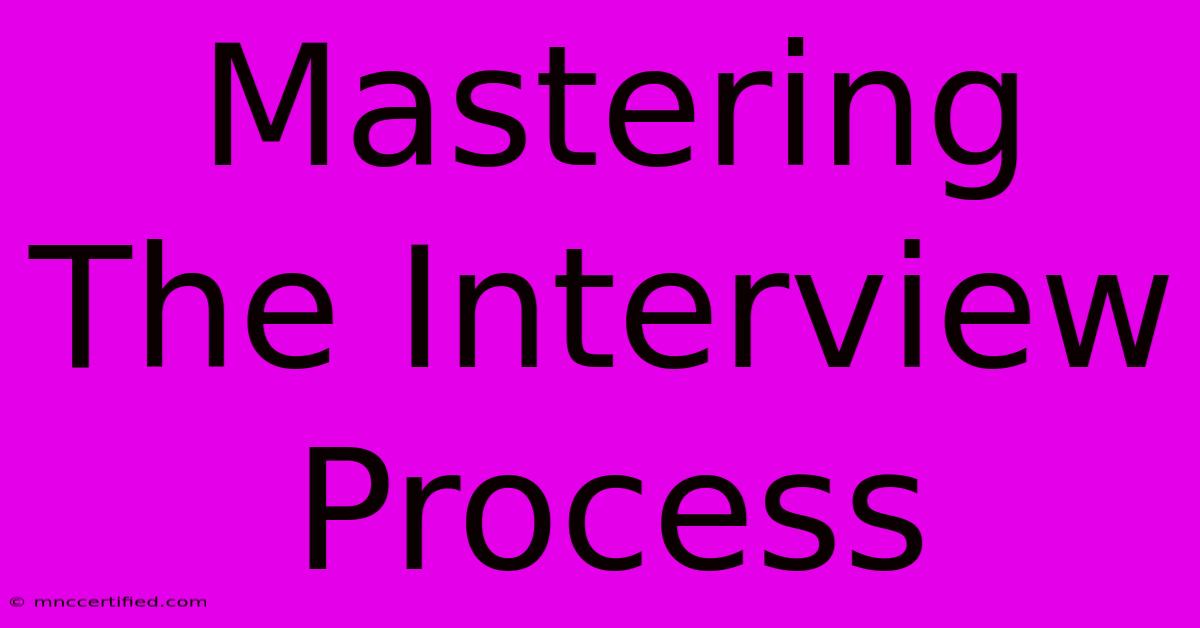Mastering The Interview Process

Table of Contents
Mastering the Interview Process: From Preparation to Post-Interview Follow-Up
Landing your dream job often hinges on acing the interview. This comprehensive guide will equip you with the strategies and skills to master the interview process, from initial preparation to securing the offer. We’ll cover everything from researching the company and crafting compelling answers to handling tough questions and following up effectively. Let's dive in!
Phase 1: Pre-Interview Preparation – Laying the Foundation
Thorough preparation is the cornerstone of a successful interview. This isn't just about brushing up on your resume; it's about showcasing your understanding of the role, the company, and the industry.
1. Research the Company and the Role:
- Go beyond the surface: Don't just read the company's "About Us" page. Delve into their recent news, press releases, social media activity, and annual reports. Understand their mission, values, and current challenges.
- Analyze the job description: Identify the key skills and responsibilities they're seeking. Think about specific examples from your past experience that demonstrate these qualities. This is crucial for tailoring your answers.
- Research the interviewer(s): If possible, look up your interviewer(s) on LinkedIn. Understanding their background and experience can help you connect with them on a more personal level.
2. Prepare Compelling Answers to Common Interview Questions:
- The STAR Method: Structure your answers using the STAR method (Situation, Task, Action, Result). This provides a clear and concise framework for illustrating your skills and accomplishments.
- Practice, practice, practice: Rehearse your answers out loud. This helps you refine your responses and build confidence. Consider practicing with a friend or mentor.
- Anticipate tough questions: Prepare for behavioral questions like "Tell me about a time you failed," "Describe a challenging situation you overcame," and "Why are you leaving your current job?" Honest and reflective answers are key.
3. Plan Your Outfit and Logistics:
- Dress the part: Research the company culture to determine the appropriate attire. When in doubt, it's always better to be slightly overdressed than underdressed.
- Plan your route: Know exactly where you're going and how long it will take to get there. Account for potential traffic delays and arrive 10-15 minutes early.
- Prepare your materials: Bring extra copies of your resume, a notepad, and a pen. If the interview is virtual, ensure your technology is working correctly and your background is professional.
Phase 2: During the Interview – Making a Strong Impression
Now comes the moment of truth. Remember, this is a two-way street. You're interviewing them just as much as they're interviewing you.
1. Make a Positive First Impression:
- Body language matters: Maintain eye contact, offer a firm handshake (if in person), and sit up straight. Project confidence and enthusiasm.
- Be polite and respectful: Treat everyone you encounter with courtesy, from the receptionist to the interviewer.
- Listen attentively: Pay close attention to the interviewer's questions and respond thoughtfully.
2. Showcase Your Skills and Experience:
- Highlight your accomplishments: Use the STAR method to illustrate your skills and accomplishments, quantifying your results whenever possible.
- Connect your skills to their needs: Emphasize how your skills and experience align with the requirements of the job and the company's goals.
- Ask insightful questions: Prepare a few thoughtful questions to ask the interviewer. This demonstrates your interest and engagement.
3. Handle Tough Questions with Grace:
- Take your time: Don't rush your answers. Take a moment to collect your thoughts before responding.
- Be honest and transparent: While you want to present yourself in the best light, avoid exaggerating or fabricating information.
- Turn negatives into positives: Frame any weaknesses as areas for growth and development.
Phase 3: Post-Interview Follow-Up – Sealing the Deal
Don't let your hard work end with the interview. A strong follow-up demonstrates your continued interest and professionalism.
1. Send a Thank-You Note:
- Within 24 hours: Send a personalized thank-you email to each interviewer, reiterating your interest and highlighting key points from the conversation.
- Add value: Mention something specific you discussed and reiterate how your skills align with their needs.
- Proofread carefully: Ensure your email is free of grammatical errors and typos.
2. Follow Up (If Necessary):
- Respect their timeline: Follow up only if the company hasn't provided a timeframe for a decision.
- Be polite and persistent: A brief and polite email checking on the status of your application is acceptable after a reasonable time has passed.
Mastering the interview process takes time and practice. By following these steps and consistently refining your approach, you'll significantly increase your chances of landing your dream job. Remember, preparation, confidence, and genuine enthusiasm are key ingredients for success!

Thank you for visiting our website wich cover about Mastering The Interview Process. We hope the information provided has been useful to you. Feel free to contact us if you have any questions or need further assistance. See you next time and dont miss to bookmark.
Featured Posts
-
Portugal Star Eyes Retirement
Nov 17, 2024
-
Grand Slam Darts 2024 Littler Triumphs
Nov 17, 2024
-
2 C Windchill In London Met Office
Nov 17, 2024
-
Baltimore Region Investment Summit
Nov 17, 2024
-
Power Algorithmic Trading Platform
Nov 17, 2024